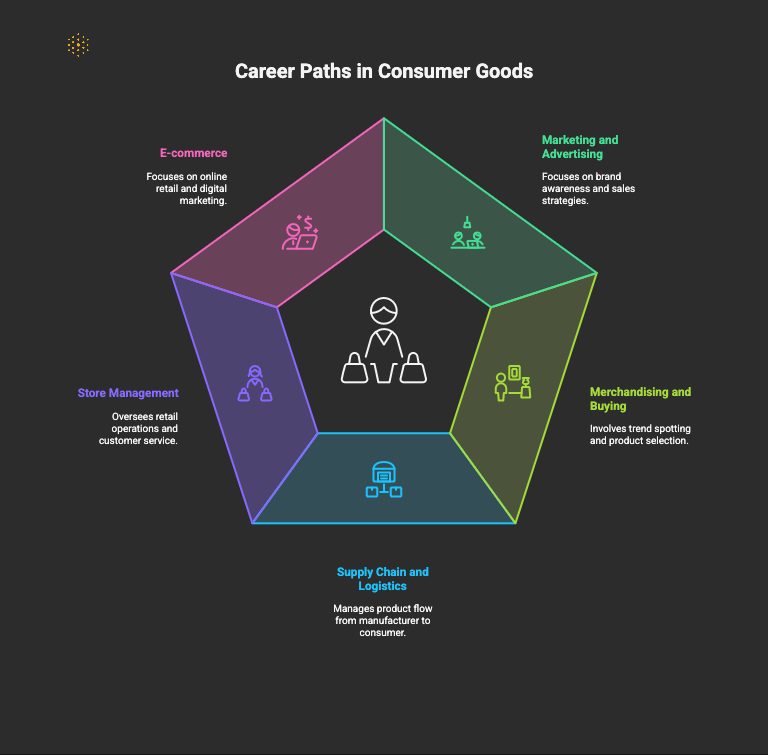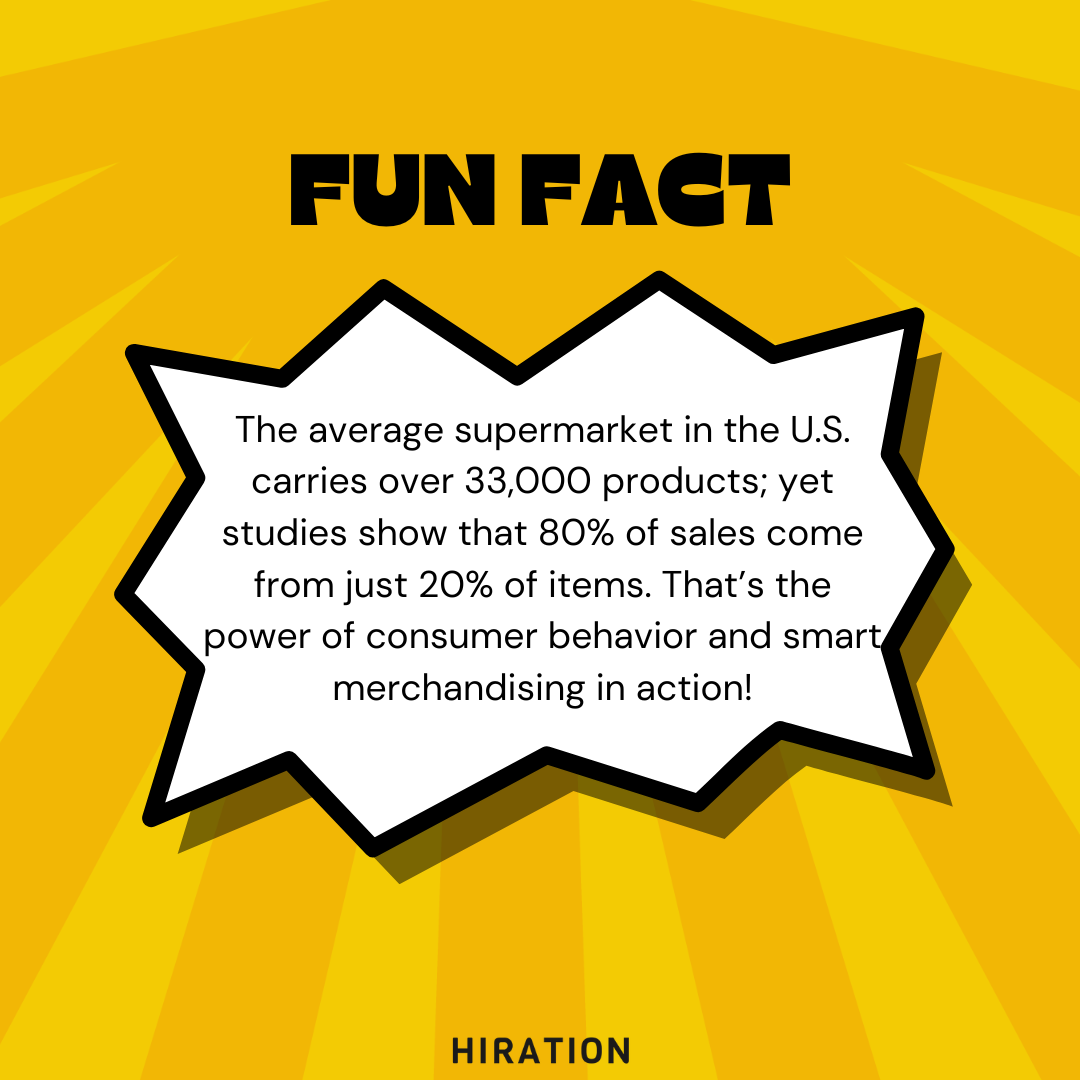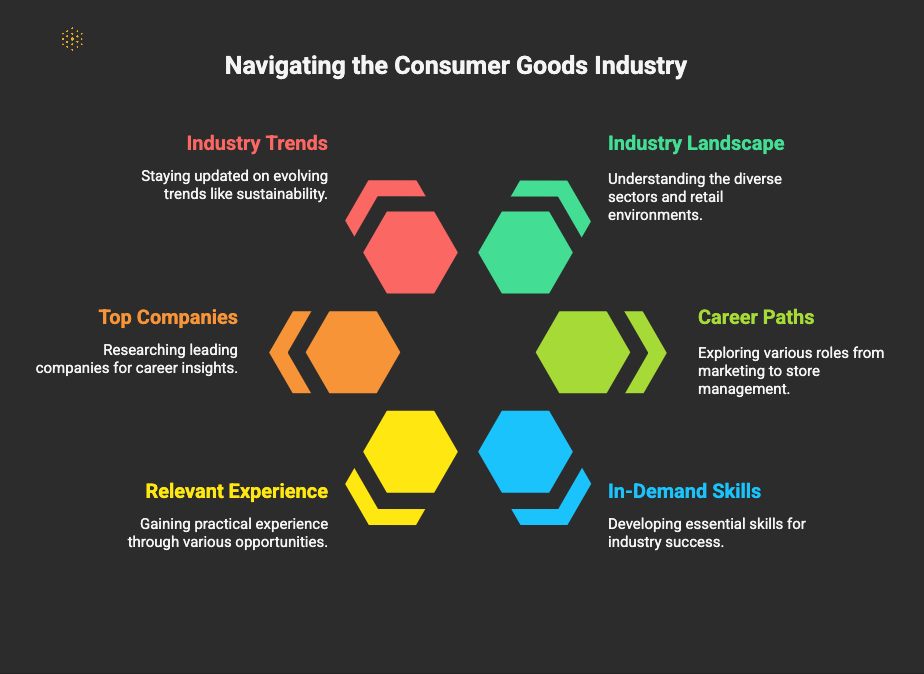How to break into the consumer goods and retail industry?
Learn the landscape, choose a path, and build skills in communication, analytics, customer service, and tech. Start with entry roles or internships, market transferable skills, research employers, and follow trends like sustainability and AI.
From global brands to local shops, the consumer goods and retail industry shapes how we live, shop, and work.
The global Consumer Goods & Retail market is booming, projected to reach $35.2 trillion by 2025 and grow to $50.8 trillion by 2030 at a CAGR of 7.65%.
Whether you're starting out or making a switch, this guide will help you navigate your path.
Backed by real data and industry insights, here are 6 key steps to building a future-ready career in this dynamic field.
1. Understand the Industry Landscape
First things first, you need to understand the industry. The consumer goods sector is made up of companies that produce and sell products directly to consumers.
Think about everything from food and beverages to electronics and apparel. The industry is broadly categorized into:
- Fast-Moving Consumer Goods (FMCG): These are products with a high turnover rate, like packaged foods, toiletries, and beverages.
- Durable Goods: These are products with a longer lifespan, such as appliances, furniture, and cars.
- Non-durable goods: These are items that are consumed in one or a few uses, like toiletries and cosmetics.
On the retail side, the landscape is equally vast, from global department stores to e-commerce giants. In fact, online retail sales are expected to capture 41% of global retail sales by 2027.
This includes everything from large department stores and supermarkets to small independent shops and online retailers.
Also Read: What are some of the most commonly asked retail interview questions?
2. Explore Diverse Career Paths
The consumer goods and retail industry offers a wide range of career paths beyond the typical sales associate role. Here are some of the key areas you can explore:
- Marketing and Advertising: This is all about creating brand awareness and driving sales. You could be involved in everything from developing marketing strategies and conducting market research to managing social media and creating advertising campaigns. A 2024 LinkedIn Jobs Report found that "digital marketing" is one of the top 10 most in-demand skills globally.
- Merchandising and Buying: If you have a knack for spotting trends, a career in merchandising or buying could be a great fit. Buyers are responsible for selecting the products that will be sold in stores, while merchandisers focus on how those products are displayed to attract customers.
- Supply Chain and Logistics: This is the backbone of the industry. Professionals in this area are responsible for the entire process of getting products from the manufacturer to the consumer. This includes everything from transportation and warehousing to inventory management.
- Store Management: If you have strong leadership skills, a career in store management could be for you. Store managers are responsible for the day-to-day operations of a retail store, including managing staff, overseeing sales, and ensuring excellent customer service.
- E-commerce: With the growth of online shopping, e-commerce has become a major area of focus for retailers. Roles in this area include e-commerce managers who oversee the online store, digital marketers, and social media managers.

3. Develop In-Demand Skills
To succeed in this competitive industry, you'll need a mix of hard and soft skills. Here are some of the most in-demand skills for a career in consumer goods and retail:
- Communication: Whether you're interacting with customers, colleagues, or suppliers, strong communication skills are essential.
- Customer Service: The ability to provide excellent customer service is crucial for building customer loyalty and driving sales.
- Analytical Skills: Retailers are increasingly relying on data to make informed decisions. Skills in data analysis and reporting are highly valued.
- Tech Savviness: With the rise of e-commerce and in-store technology, being comfortable with new technologies is a must. This includes everything from point-of-sale (POS) systems to customer relationship management (CRM) software.
- Adaptability: The retail industry is constantly changing, so being able to adapt to new trends and technologies is key.

4. Gain Relevant Experience
Getting your foot in the door is the next step. Consider these options to gain valuable experience:
- Entry-Level Positions: Starting in an entry-level role like a sales associate or cashier can provide you with a solid foundation and a deep understanding of the customer experience.
- Internships: Many companies in the consumer goods and retail sector offer internships in areas like marketing, merchandising, and supply chain. This is a great way to gain hands-on experience and network with industry professionals.
- For Career Changers/Transitioners: If you're looking to move into this sector from another industry, focus on your transferable skills. Skills like project management, customer service, data analysis, and financial planning are highly valued. Consider upskilling with online courses or certifications in areas like digital marketing or supply chain management to make your resume more competitive. Networking and conducting informational interviews with professionals already in the industry can also provide invaluable insights and potential opportunities.
- Volunteer: Volunteering at a non-profit retail store can also provide you with relevant experience and demonstrate your commitment to the industry.
5. Research Top Companies
The consumer goods and retail industry is home to some of the world's most recognizable brands. Some of the top companies in this sector includes:
| Sector | Top Companies |
|---|---|
| Consumer Goods | Procter & Gamble |
| Nestlé | |
| Unilever | |
| Coca-Cola | |
| PepsiCo | |
| Retail | Walmart |
| Amazon | |
| The Home Depot | |
| Costco | |
| Target |
Researching these companies can give you an idea of the different career opportunities available and the company culture that might be a good fit for you.
6. Stay Updated on Industry Trends
The consumer goods and retail industry is constantly evolving. Staying on top of the latest trends is crucial for career growth. Some of the key trends shaping the industry include:
- Sustainability: Consumers are increasingly prioritizing ethically produced and environmentally responsible products. Retailers are responding with eco-friendly offerings and greater supply chain transparency. In fact, a 2024 PwC survey found that consumers are willing to pay an average of 9.7% more for goods that are sustainably produced or sourced. This shift is driving companies to not only revamp product lines but also re-evaluate their manufacturing, packaging, and logistics strategies.
- Personalization: Retailers are using data and technology to create more personalized shopping experiences for their customers.
- The Rise of AI: Artificial intelligence is being used in everything from inventory management and supply chain optimization to personalized product recommendations.

Wrapping Up
Breaking into the consumer goods and retail industry takes more than just interest - it takes insight, adaptability, and the right preparation.
As the industry grows and evolves, staying informed and equipped with in-demand skills will set you apart.
At Hiration, we make that journey easier. From AI-powered resume reviews to personalized interview prep and LinkedIn optimization, our platform helps you stand out in competitive hiring pipelines, without the guesswork.
Ready to take the next step in your career? We’re here when you are.
Frequently Asked Questions
-
What is the consumer goods and retail industry?
It includes companies that produce and sell products directly to consumers. The retail landscape ranges from global department stores to e-commerce giants.
-
What is the difference between FMCG, durable goods, and non-durable goods?
FMCG are products with a high turnover rate, like packaged foods, toiletries, and beverages. Durable goods have a longer lifespan, such as appliances, furniture, and cars; non-durable goods are consumed in one or a few uses.
-
How do you break into the consumer goods and retail industry?
Start by understanding the landscape, exploring career paths, developing in-demand skills, gaining experience, researching top companies, and staying updated on trends. These actions help you build a future-ready career in this dynamic field.
-
Which career paths can you pursue in consumer goods and retail?
You can pursue marketing and advertising, merchandising and buying, supply chain and logistics, store management, or e-commerce.
-
What skills do you need for a career in consumer goods and retail?
Focus on communication skills, customer service, analytical skills, tech savviness, and adaptability. Retailers are increasingly relying on data to make informed decisions.
-
How can you gain relevant experience if you are new to retail?
Start in entry-level roles or internships, and try Volunteering at a non-profit retail store. Highlight transferable skills, upskill with online courses or certifications, and network.
-
Can you transition into retail from another industry?
You can transition by focusing on transferable skills like project management, customer service, data analysis, and financial planning. Upskill with online courses or certifications and use networking and informational interviews.
-
Why should you research top companies before applying?
Researching these companies can give you an idea of the different career opportunities available and the company culture that might be a good fit for you.
-
What trends are shaping the consumer goods and retail industry?
Key trends include Sustainability, personalization, and the rise of AI. Retailers are using data and technology to create more personalized shopping experiences for their customers.
-
How is e-commerce changing retail?
Online retail sales are expected to capture 41% of global retail sales by 2027. E-commerce has become a major area of focus for retailers.



